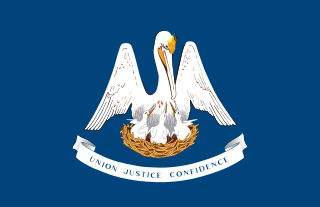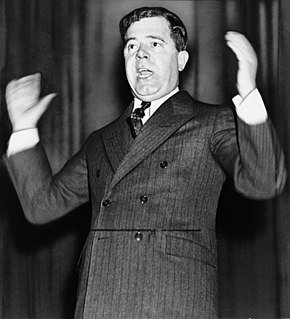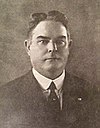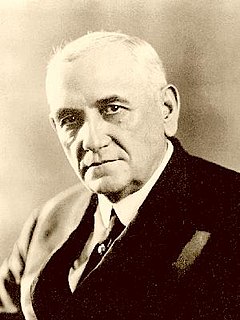
Sam Houston Jones was the 46th Governor of Louisiana for the term from 1940 to 1944. He defeated the renowned Earl Kemp Long in the 1940 Democratic runoff primary election. Eight years later, Long then in a reversal of 1940 defeated Jones in the 1948 party primary.

Richard Webster Leche was an American attorney, judge, and politician, elected as the 44th Governor of the U.S. state of Louisiana. He served from 1936 until 1939, when he resigned. Convicted on federal charges of misuse of federal funds, Leche was the first Louisiana chief executive to be imprisoned.
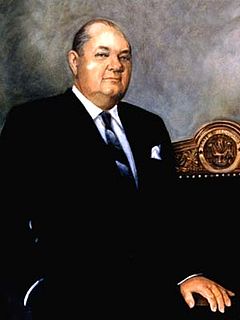
James Albert Noe Sr. of Monroe served for three and a half months as the 43rd Governor of Louisiana after the death of Oscar K. Allen on January 28, 1936.

The Louisiana gubernatorial election of 1944 was held in two rounds on January 18 and February 29, 1944. Like most Southern states between the Reconstruction Era and the Civil Rights Movement, Louisiana's Republican Party was virtually nonexistent in terms of electoral support. This meant that the two Democratic Party primaries held on these dates were the real contest over who would be governor. The 1944 election saw the reformer ‘anti-Long’ faction retain power for another four years under Jimmie Davis.

Lewis Lovering Morgan was an American lawyer and politician from Covington, Louisiana.

Charlton Havard Lyons, Sr., also known as Big Papa Lyons, was a Shreveport oilman who in March 1964 waged, as a strong segregationist, the first determined Republican bid for the Louisiana governorship since Reconstruction. Lyons also made a strong but losing bid for Louisiana's 4th congressional district seat in the United States House of Representatives in a special election held in December 1961. At the time of his death, Lyons was considered "Louisiana's Mr. Republican".

The Louisiana gubernatorial election of 1956 was held on January 17, 1956. The 1956 election saw the election of Earl K. Long to his second full term as Governor of Louisiana. He received over 50% of the vote, defeating his opponents so soundly that no runoff vote was needed.

The Louisiana gubernatorial election of 1963–64 was held in three rounds. The two Democratic Party primaries were held on December 7, 1963 and January 11, 1964. The general election was held on March 3, 1964. The 1964 election saw the election of John McKeithen as governor.

The Louisiana gubernatorial election of 1959–60 was held in two rounds on December 5, 1959, and January 9, 1960. After an election which featured some of the most racially charged campaign rhetoric in Louisiana political history, Jimmie Davis was elected to his second nonconsecutive term as governor after defeating the Republican candidate, Francis Grevemberg, in the general election.

The New Orleans mayoral election of 1930, held in January of that year, resulted in the election of T. Semmes Walmsley to his first full term as Mayor of New Orleans.

The Louisiana gubernatorial election of 1924 was held in two rounds on January 15 and February 19, 1924. Like most Southern states between the Reconstruction Era and the Civil Rights Movement, Louisiana's Republican Party was virtually nonexistent in terms of electoral support. This meant that the two Democratic Party primaries held on these dates were the real contest over who would be governor. The 1924 election saw Henry L. Fuqua defeat Hewitt Bouanchaud to become Governor of Louisiana, and saw the beginning of the political rise of Huey P. Long, who came in a surprisingly strong third.

The Louisiana gubernatorial election of 1940 was held in two rounds on January 16 and February 20, 1940. Like most Southern states between the Reconstruction Era and the Civil Rights Movement, Louisiana's Republican Party was virtually nonexistent in terms of electoral support. This meant that the two Democratic Party primaries held on these dates were the real contest over who would be governor. The election resulted in the defeat of Earl K. Long and the election of Sam H. Jones as governor of Louisiana on a reform platform.

Robert Wilson Ewing, I, also known as Colonel Ewing, was a prominent newspaper journalist, editor, and publisher and political figure, primarily in Louisiana, in the last two decades of the 19th century and the first third of the 20th century.

The Republican Party of Louisiana is the U.S. state of Louisiana's organization of the national Republican Party. The state chairman is Louis Gurvich, a businessman from New Orleans, who was elected on February 24, 2018. Since the late 20th century, white conservatives in the states have mostly shifted to the Republican Party from the Democratic Party. As of 2016, every statewide elected official in Louisiana, with the exception of the governor, is a Republican.

Cecil Morgan Sr., was a leader of the legislative forces that in 1929 attempted to impeach Louisiana Governor Huey Pierce Long Jr. Later, Morgan was an executive of Long's nemesis, the former Standard Oil Company, and the dean of the Tulane University Law School in New Orleans.
Francis Edward Kennon, Jr., usually known as Ed Kennon, is a multi-millionaire Shreveport real-estate developer from Shreveport, Louisiana, who is a former member of the Louisiana Public Service Commission, the regulatory body for oil, natural gas, and utilities.
Lee Emmett Thomas was an attorney and banker who served as the mayor of Shreveport in Caddo Parish, Louisiana, from 1922 to 1930. He was from 1912 to 1916 the Speaker of the Louisiana House of Representatives.
Étienne Joseph Caire, I, , was a merchant, pharmacist, major sugar cane planter, and banker from Edgard in St. John the Baptist Parish, Louisiana. He ran in 1928 as the first Republican nominee for Governor of Louisiana in the 20th century when he challenged populist Democrat Huey Pierce Long Jr. He received only four percent of the vote. That year the Republican Party ran a slate of candidates for statewide offices for the first time since the late 19th century.

